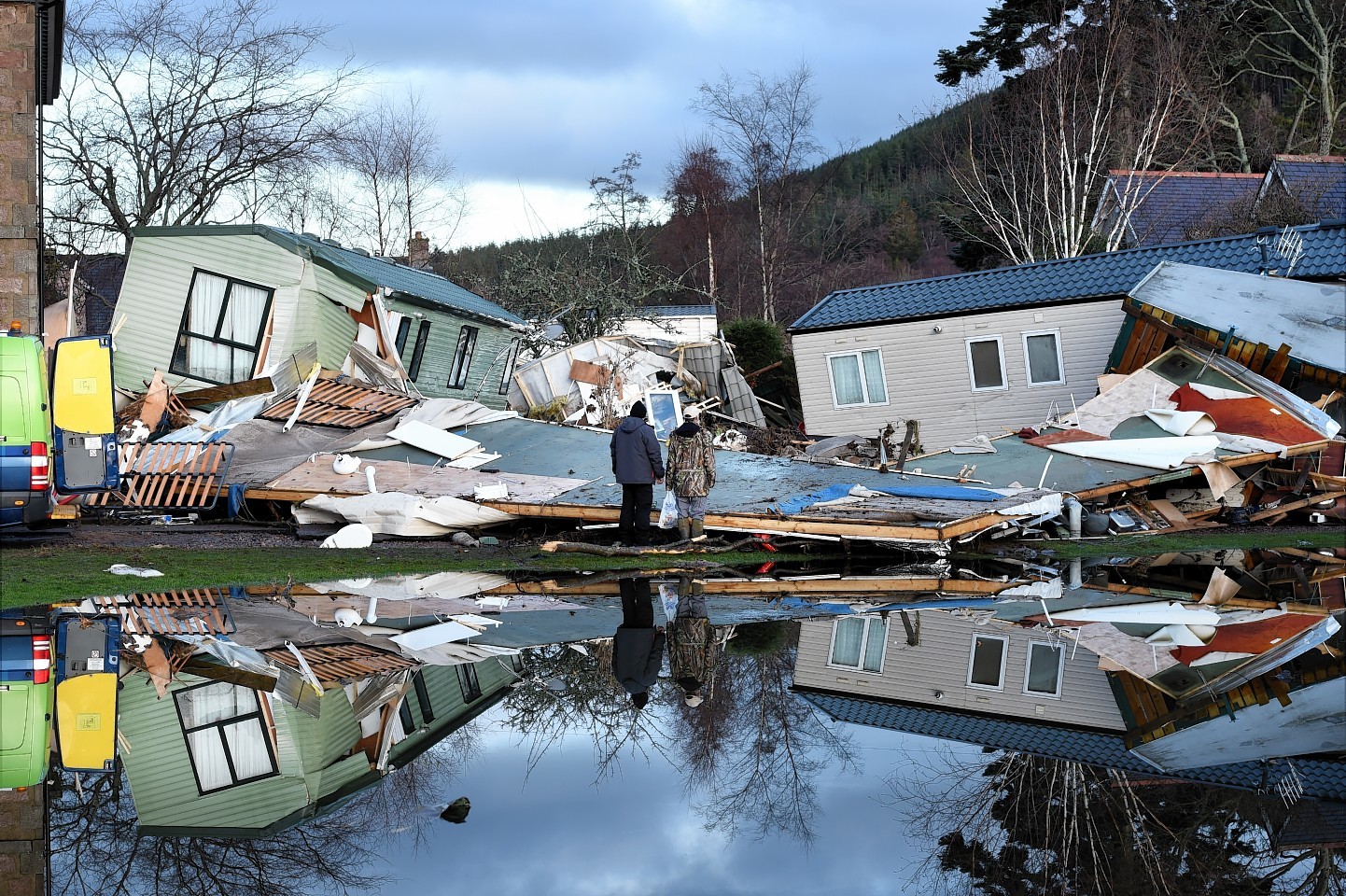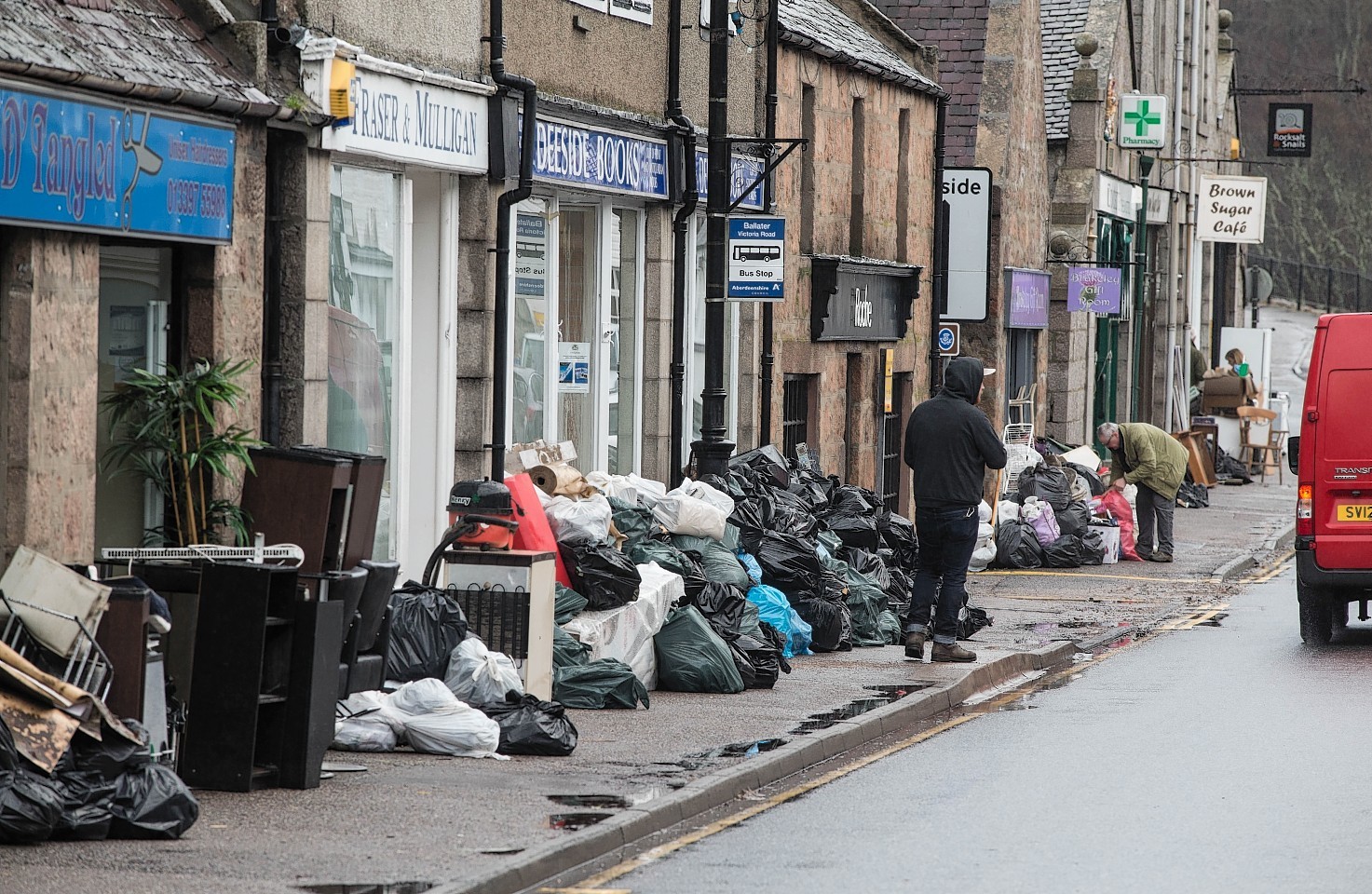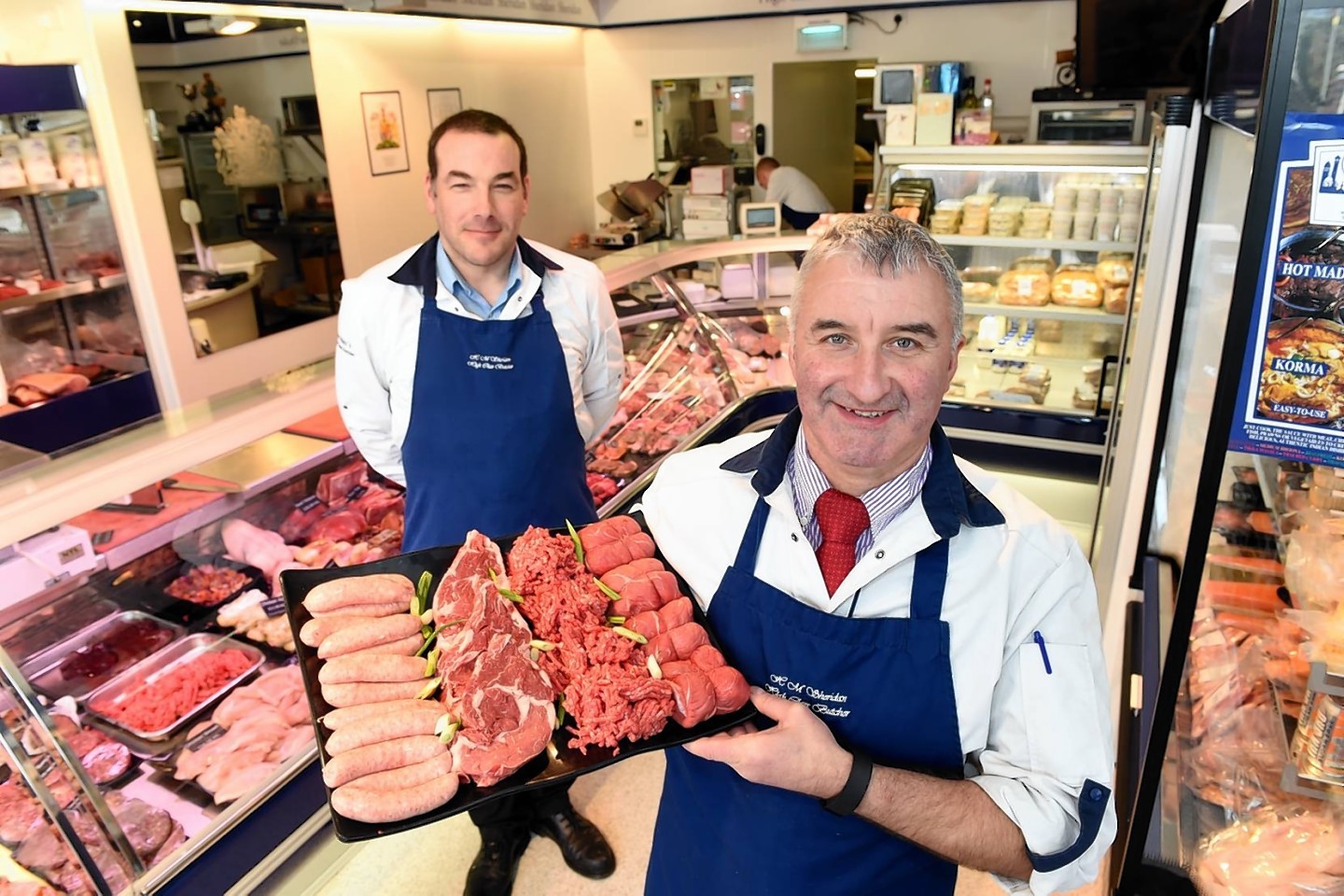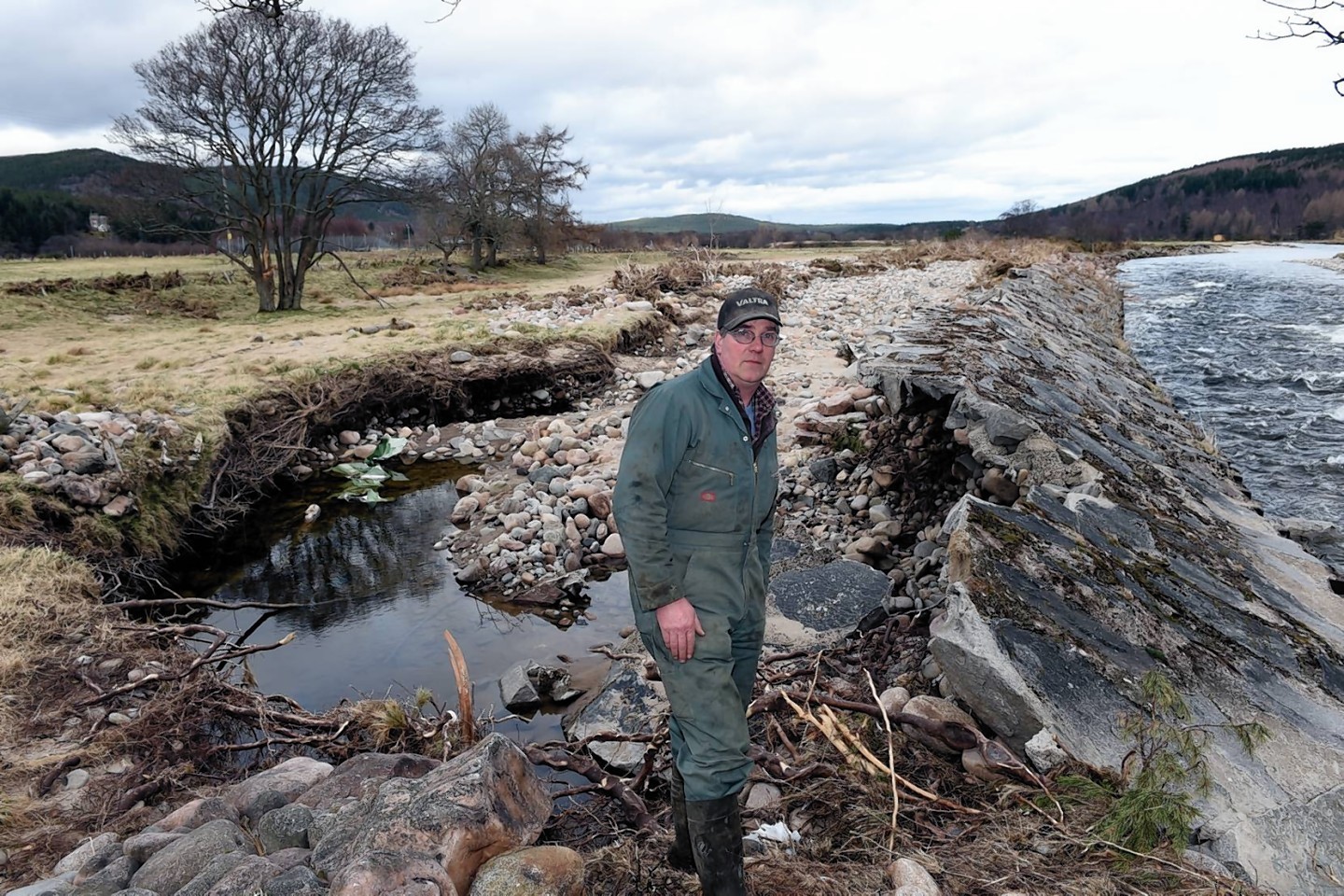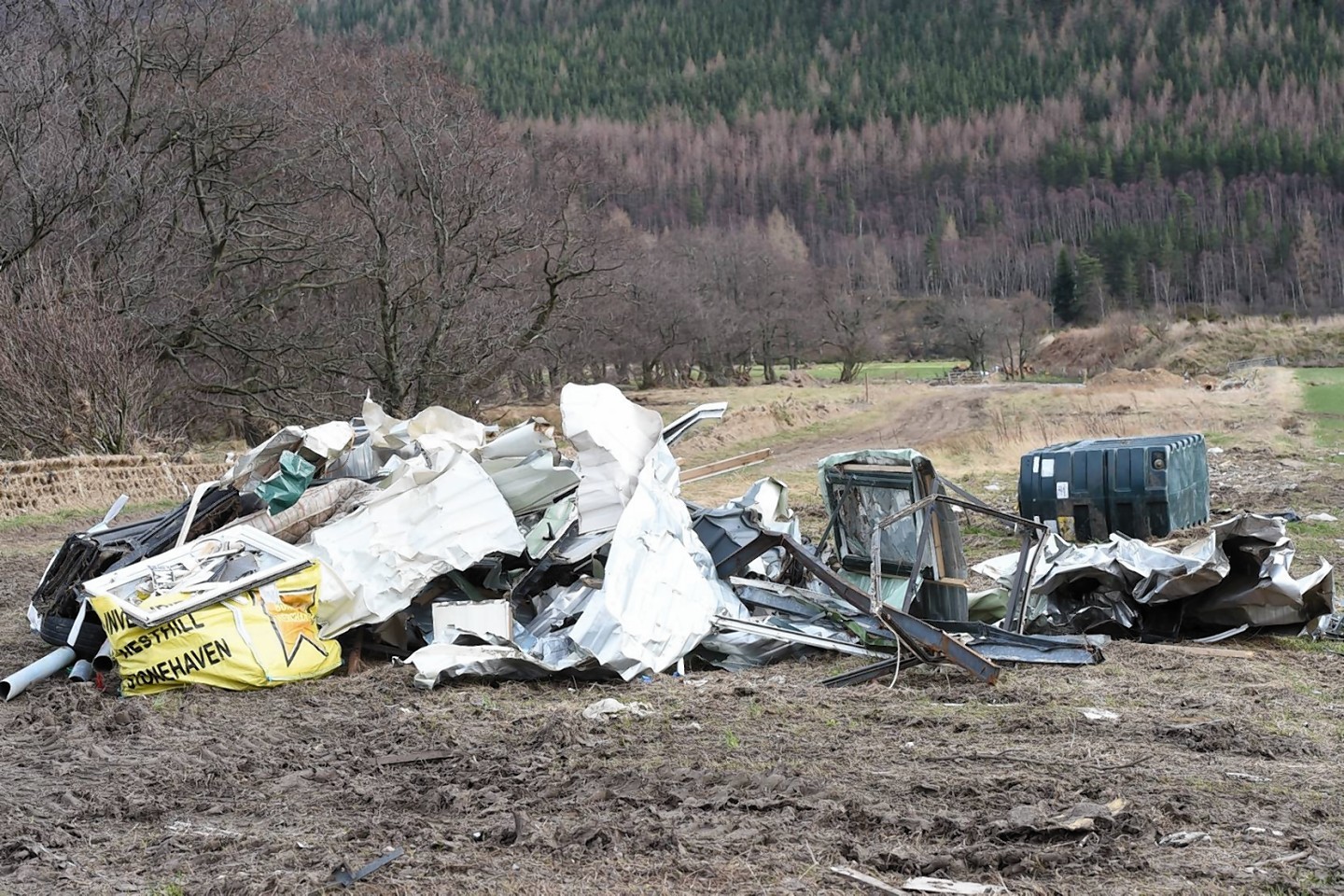Standing on Ballater’s main artery today, the River Dee is barely visible – but its impact on the village will now be forever palpable.
A pile of sandbags sits at the crossroads between Albert Road and Bridge Street, a stark reminder that the surreal events which struck the village on December 30 were anything but just a bad dream.
On that morning, incessant rainfall, coupled with snow melt from the hills of the Cairngorms, caused the river to burst its banks and ruthlessly tear through Ballater.
The ensuing deluge cut off neighbouring Braemar from the rest of the world, sent static caravans floating down the valley, destroyed bridges and roads the length of the Dee, and devastated a myriad of homes.
On Ballater’s Bridge Street, shops, cafes and hotels were saturated by several feet of water.
In the days that followed, with rainfall persisting, the rivers Don, Ury and Ythan all overflowed, drowning properties in Port Elphinstone, Inverurie, Kemnay, Kintore, Ellon, Newburgh, Marykirk, Culter, Bridge of Don and Maryculter.
Some 600 homes and 100 businesses are estimated to have been flooded in Aberdeenshire in the days following Storm Frank – 307 and 60 of which, respectively, were in Ballater.
Homes in the Deeside village now lie in varying states of dilapidation and repair. And the once-bustling shop fronts of Bridge Street have been replaced by empty rooms and crumbling walls, also in various phases of being rebuilt.
Amidst the damage, however, the lights of HM Sheridan butchers shine brightly.
Its workforce have returned to normal service at the busy shop, which has been speedily dried and refitted following the floods.
And yesterday the shop was officially reopened by none other than the Duke and Duchess of Rothesay.
Almost three months on from the events of the New Year, the butchers – where the waters swept away between £40,000 and £50,000 of stock – is back doing business, complete with a “Storm Frank Sausage”.
With its doors open once again, fresh optimism is spreading throughout the village and wider Deeside.
Around the same time as Sheridans reopened, neighbouring Aboyne’s Footprint shoe shop – also struck by the floods – did the same.
“It is a drive, you have got to drive at things” , said Sheridans’ co-owner, John Sinclair, as his staff packaged up a nest of sausages for an elderly couple.
Mr Sinclair runs the shop with Barry Florence and watched as his home, business and the Ballater Golf Club, of which he is president, flooded on December 30.
He said: “It has been pushing, pushing and pushing to get things done.
“Business has been very good even with orders down the country, down Deeside, Banchory and Aberdeen.
“(The street) is still not a pretty sight for people coming into the village. It doesn’t look great but things are moving on.
“Hopefully, by the first week of May there will be a lot more shops open. That would be a big boost to the village.”
His positivity was shared across the road at Deeside Books.
Owner Bryn Wayte has started trading online and said he and his staff had refused to “sit on their bums” since watching the river fill the store and his attached home.
Between 7,000 and 8,000 books were lost at the shop.
But Mr Wayte responded: “We are stripped out and dried out, but it is probably going to be summer time that we reopen.
“We have our motivation and the way things are at the moment, there is little else that we can do but reopen. It is a case of getting on with it.
“We have got the internet side of the business up and running again. We have got to get going, you can’t feel sorry for yourself.”
Now though, it has emerged that the floods have also affected those Ballater businesses which initially survived the downpour.
At the top end of Bridge Street, Ballater’s displaced population has led to businesses reporting downturns of between 40% and 80% on the 2014-15 winter season, which itself was particularly poor.
The business community, though, had been struggling long before the floods arrived.
High street stores in Ballater have become increasingly restless at ‘unfair’ business rates coupled with high rents.
The local economy also felt the knock-on effect of a huge fire which destroyed tourist attraction, the Old Royal Station, and another blaze at the Darroch Learg hotel last year.
And last week, just to add to the village’s woes, a fresh blow fell.
McEwen’s of Perth announced it was going into administration, taking with it another Bridge Street outlet.
The loss of Ballater Caravan Park, where the remaining statics have been either crushed or moved on, is also a point of concern.
“It [trade] was down considerably in January and February because there are 300 families displaced, they are not going to be buying anything, and, of course, there is a lack of tourist accommodation,” said Alistair Cassie, who runs a hardware store on Bridge Street.
“Unfortunately, Ballater has followed a lot of other places in getting a bit run down, but, hopefully, we can recover.
“Yet I think it’s going to take a wee while.
“I think it can be done, but we want more of a variety of shops and eating places and shops.”
He welcomed progress down the bottom end of the street, adding: “The more shops we can get open, the better.”
Richard Watts, who runs Ballater’s CycleHighlands and is chairman of the village business association said: “The sort of downturn every single shop at the top was reporting was quite pronounced. They have been hit by the removal of our population due to the flood.
“That’s McEwen’s gone from the top, and that is a big hole at the top of the village.
“I have no doubts we’ll all get back going again and everybody is positive about that. I think it is getting to that point, a lot of businesses trying to survive to that point and it is a little bit worrying.”
“The message has got out, to some extent, that Ballater is shut and devastated,” said Aboyne, Upper Deeside and Donside councillor, Peter Argyle, “So we all need to work hard to get the message out that Ballater’s future is far from that.
“Ballater is very much alive, and very much open for business.”
Back in Sheridan’s, the elderly couple were scanning the meat counter once again, running their eyes across mounds of beef olives, venison and hunks of pork and lamb.
“There were a couple of days I went back to my house and I looked and thought ‘I just want to go hame’, you know?” – said Mr Sinclair.
“But”, he shrugged, “What is the point? There is nae point being miserable is there? At the end of the day, naebody lost their life, and Ballater survived.”
Aftermath: Time to help businesses?
Ballater traders have called for business rates to be reassessed in the village in light of the recent flooding.
Companies in the Deeside community have been lobbying for changes to the rates system for years.
Business rates are a tax on business property which helps pay for local council services.
Ballater businessman, Alistair Cassie, said: ‘My biggest outlay per month is business rates. The whole system of rating is, I think, out of date.
“Whether you turn out £10million in a shop like mine or £10,000, your rates are the same. And there is no logic in that.’
Chairman of the Ballater Business Association, Richard Watts, said: “(Business rates) has been an issue for a long time, and, in comparison with any other village in Scotland, we pay the highest.
“What concerns me is all these empty shops that we’ve got and are going to have.
“Anyone starting out is going to have a real fight on their hands just trying to meet the cost of rates and it is really not very helpful in regards to regenerating the economy for us locally.”
“I am not sounding very optimistic, but in the long term, I am because what I am hoping is the cost of running a business in Ballater will come down.
He added: “It is a great place, the shops are great and the architecture and local environment make it a great place to come, and I think people always want to come.
‘And I think this gives us a great chance to hopefully regenerate and improve things. But I just wish the background difficulties, not even including the flood, were a little bit easier.’
Farmer fears future floods
An Aberdeenshire farmer whose holdings were left “a complete shambles” by the floods said he fears future flooding along the River Dee will eat away at his land.
Allan Adams said the “new path” of the watercourse came just 492ft from his nearest cow shed, whereas before it sat some 1,300ft away.
He is worried that the situation will only worsen and, during any future flood, that his cattle near the river could end up “trapped”.
The 56-year-old tends to some 1,100 acres between his land on the fringes of Ballater and in Braemar.
He said he was given no prior warning of the imminent flooding on December 30, but had been keeping a close eye on the unusually high waters.
Sensing danger, he shifted his cattle from riverside fields to safety on higher ground.
Later in the morning, the river started to surge and his wife, Elaine, swiftly salvaged the paperwork on the bottom floor of their house before it flooded.
Sheds, machinery and tools were soon being consumed by the Dee, overwhelming the North Deeside Road which splits his land – almost reaching the Pass of Ballater.
The remnants of roughly 25 caravans washed up on his land, with the clearing-up operation still continuing, despite huge efforts by himself and local groups.
The father-of-three, whose family have farmed Eastfield of Monaltrie since the 1950s, said: “I saw the water coming up the sheds and I thought: ‘This is it, we’re doomed’.
“We never expected it. Even the weather forecast wasn’t particularly bad.
“I was sitting, watching and worrying. There wasn’t much to do apart from move that cattle. There were haybales floating down the road.
“You kind of gave up, resigned yourself to the fact. Our car was sitting in water and a neighbour said to me: ‘You can move that car’. He did it for me. I’d seen it myself, but it was surreal. I just never expected it.”
He described the scene when the river receded as being “an unbelievable mess”.
Mr Adams added he was “concerned” for the future of his farm.
He said: “I think it is a serious problem because the Dee has changed course. Okay, a big flood is not going to help, but a small flood, the water is now coming down a different way. It comes directly towards the farm.
“Until they fix this piece here, I am genuinely worried.”
